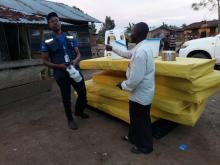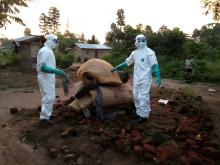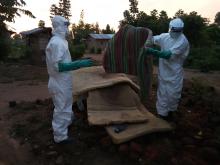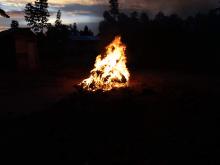How an encounter with Ebola in the Democratic Republic of the Congo inspired change
Hugues Musumbu is a man with a ready smile, but a self-effacing air.
Today, he visited a hospital in Lubero in the Democratic Republic of the Congo. The town is in North Kivu Province where an Ebola outbreak was declared on 1 August. Hugues works for the World Health Organization (WHO) as an expert in infection and prevention control (IPC). He interviewed the health workers and quickly understood there was a problem.
“While the facility had put in place good IPC measures such as handwashing stations, I realized there were big gaps in knowledge regarding Ebola ,” said Hugues. “We must come back urgently and give the staff a briefing.”
Until this May, Hugues was a driver for WHO. How he came to be a much sought after member of WHO’s IPC team is a tale of true grit and lucky encounters. Much of his story is tied to the Democratic Republic of the Congo’s long history with Ebola.
“I was born in a village in Bandundu province,” said Hugues. “My family was poor and I was the victim of a divorce. My father had three wives. But from my earliest memories I dreamt of being a doctor and so I studied hard in school.”
When he finished primary school at the age of 12, Hugues’ father said it was time to stop learning and start earning.
“I kept on insisting on going to classes and so my father chased me out of the house,” said Hugues. “I was left on the street with a T-shirt and a pair of shorts. I remember the clothes even had holes.”
Hugues ended up having to beg for money and finally managed to scrape together enough to reach the city of Kikwit where one of his stepmothers lived – she agreed to give him a place to sleep but nothing more.
“I sold petrol, polished shoes and carried water. I did everything so that I could make enough money to pay for my uniform and go to school,” remembers Hugues.
But his hopes of becoming a doctor were dashed when despite his outmost efforts, Hugues failed his high school exam. Disappointed, he blamed himself for ignoring his father and stubbornly insisting on getting an education.
“I felt like a failure. I decided to give up and became a taxi driver,” said Hugues.
Then in 1995, Ebola came to Kikwit. Like many others, Hugues lined up outside the WHO base seeking a job. He kept getting turned down but one day the operations officer said he was looking for someone who could climb trees to help put up wiring. Hugues volunteered and soon convinced the WHO response team that he was a capable driver.
And for the next 23 years, Hugues drove cars for WHO.
“He was always conscientious. You could count on him to be on time and to make an extra effort,” said Dr Yokouide Allarangar, the WHO representative for the DRC.
As a WHO driver Hugues saw first-hand the benefits of good public health and credits his exposure to national and international health experts with keeping his interest in medicine alive. But as the father of six children, becoming a doctor seemed a distant possibility.
What finally pushed him to take up his studies again was a misunderstanding with his supervisors and the fear he might lose his job.
“I just couldn’t go back to driving taxis,” said Hugues. “I figured I had just about enough savings to go to medical school.”
In the end Hugues stayed on at WHO and so began a tortuous ten years, where he studied until 4pm and then went off to work at 6pm. He would catch a few moments of sleep between his studies and his night shift.
“It was tough. I was studying with young people, some of whom I remember driving to school,” said Hugues. “Also the other drivers were often suspicious of me, but what kept me going was my personal promise to finish what I had started.”
Finally in 2014, Hugues achieved his mission impossible. At the age of 37, he got his medical degree. But the hard realities of life intervened again, as he realized that what he would earn as a doctor was far too little to support his family. So he kept on driving.
Then Ebola thrust itself once again into his life. This time it was the country’s 9th outbreak which was announced by health authorities in May this year in the Equateur Province.
“I came to Kinshasa to support the response,” said Renee Van de Weerdt, Chief Emergency Management Support for WHO in Geneva. “When I saw Hugues, I remembered how on a previous mission he had told me about his medical degree. I suggested he put his name forward to support the new outbreak.”
Soon Hugues was managing a fleet of vehicles as part of the logistics team and it was his turn to offer jobs.
“When some of the young drivers didn’t show up on time, I tried to give them a second chance. I said if you work hard maybe you’ll get noticed,” said Hugues.
But little did he know that he was about to get his own lucky break.
During the outbreak in Equateur, Kevin Ousman was in charge of WHO’s infection and prevention control (IPC) team and he needed to scale up his operations fast.
“It was a massive job and I was in desperate need of about 20 IPC experts,” said Kevin. “As I was waiting for a car, wondering how I would fill these positions, I saw Hugues.”
Kevin had met the doctor-driver a year earlier and had been impressed with his story. He quickly grabbed Hugues and asked him if he would consider supporting his team.
The answer was “It would be the biggest privilege of my life.”
For the past four months, Hugues has worked around the clock training health care workers and communities on how to put in place life-saving infection and prevention control measures to stop Ebola from spreading.
“I am so happy. I feel very comfortable with what I’m doing,” said Hugues. “I am grateful to all the people at WHO who have helped me get to where I am today.”
Now if he sees a child on the street polishing shoes, he is quick to hand out some bills and give some advice.
“I was zero. I was no-one, but because I went to school I became someone. I tell the children use this money to save for your education. If I can do it, you can too.”







